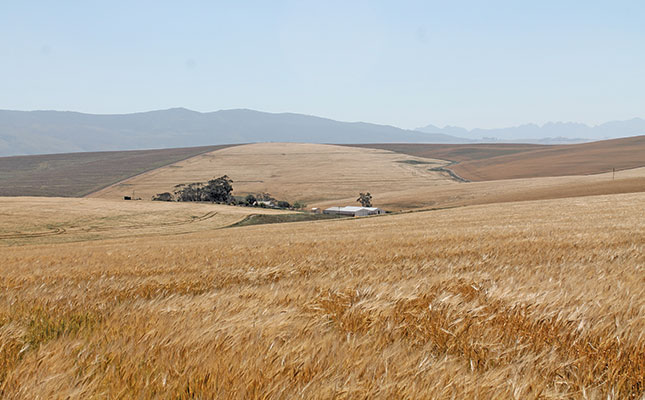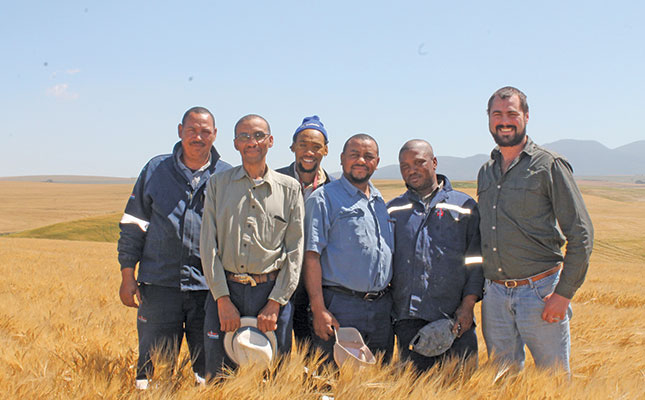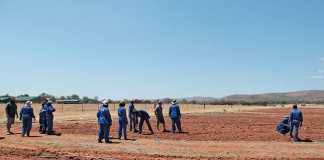
Photo: Jeandré van der Walt
The Overberg Boerdery Trust was launched in 2006 on the South African Breweries Barley Farm (SABF), a model operating farm for dryland barley production near Caledon in the Western Cape.
“Gerhard Greeff, a previous agricultural services manager at the former SAB, urged us to start the trust,” says board chairperson Christiaan Hans.
Hans’s wife, Beryldina, is vice-chairperson of the trust. The other members are Boysile Hoko, Simphiwe Hoko, André Hans, Johan Andries and their respective spouses, Titi Hoko, Cindy Hoko, Jacolene Hans and Maria Andries.
In 2007, the members planted their first barley crop on 68ha leased with financial assistance from the Department of Public Works. SAB Maltings also helped with interest-free loans.
Since then, the trust has gradually expanded its operations and now farms on 135ha.
“In 2016, we leased an additional 65ha of municipal land, just outside Caledon, with the help of Casidra [the Cape Agency for Sustainable Integrated Development in Rural Areas]. A lease of nine years and eleven months was agreed upon,” says Hans.

Production tonnage and profit have increased to the extent that the members no longer rely on funding from SAB. In 2018, even after a sizeable dividend payout (they prefer not to disclose the amount), the trust was financially sound enough to purchase the next season’s inputs.
Farming in mutualism
Farming operations on the 68ha coincide with SABF’s rotation system, which is also followed on the municipal land. The members usually use a five-year rotation of canola, wheat, barley, and oats. Farm manager Hennie le Roux says this reduces the risk of soil depletion, as well as pest and disease build-up.
After the merger between SAB and AB InBev in 2016, the company launched a programme aimed at encouraging local barley production and incorporating emerging farmers in the supply chain. The agreement, valid until 2018, specified that when emerging farmers produced malt-quality barley, AB InBev would take all of it.
“They therefore didn’t form part of Unigrain’s mandate contacts,” explains Le Roux.
To enable the trust to produce barley throughout these two years, they planted 68ha to barley on different lands at SABF to prevent pest and disease build-up.
“Because the trust followed the five-year rotation system before the agreement, they were subject to great fluctuations in their profit margins. This agreement between AB InBev and emerging farmers gave the trust an enormous boost, as barley has the highest profit margin by far,” says Le Roux.
The members managed to improve their average barley production from 2,5t/ha in 2007 to 3,46t/ ha in 2018. They achieved a canola yield of 1,8t/ ha in 2014, while wheat yielded 2,84t/ha in 2015.
Their malting barley is sold to AB InBev, which assists them with marketing their other crops.
Addressing challenges
According to Hans, drought, and all the pests associated with it, is a major challenge, as it can have a significant impact on yield. To counter its effects, the trust makes use of conservation farming practices, such as minimum tillage to boost the health, structure and moisture-holding capacity of the soil.
Every third year, soil samples from their lands are sent for analysis to determine the fertiliser requirement.
“Because SABF is an experimental farm, we regularly conduct trials on the farms. We’re currently running a five-year optimal fertiliser trial on a small piece of land. The results from the trial are applied to the commercial lands to save on fertiliser costs,” says Le Roux.
A chemical spray programme is followed from June to September. He says that although they follow a programme, no optimal dates are set.
“We’d rather conduct regular inspections to determine whether or not to spray. In this way, we keep our costs low and prevent chemical resistance build-up.”
As the area is particularly windy, all of the crops on SABF are cut and swathed seven to 10 days before harvesting to prevent losses to wind.
After harvesting, the team leaves stubble on the ground to preserve soil moisture and improve soil structure.
Procurement of land in the area is another challenge. According to Le Roux, Caledon is a privileged area in terms of rainfall, and therefore receives good returns.
“Consequently, land isn’t easily acquired in the area.” It also comes at a high cost.
The role of mentorship
Le Roux stresses that it is important for emerging farmers to have support and even financial backing, and AB InBev is 100% committed to the trust.
“If emerging farmers don’t have a pillar of commercial farmers for support, they will struggle.”
Hans concurs. “As emerging farmers, we need the knowledge and assistance of commercial farmers.”
Both agree that honest and constructive discussions between mentor and mentee are crucial.
Le Roux says that a mentor should be a counsellor who provides timely advice, but it is up to the mentee to decide whether he or she wants to follow it. It is also important for the mentee to take ownership.
According to Hans, their dream is to obtain more land to increase production.
“Ideally, we’d like to become the best barley producers in the area.” This would enable them to create work opportunities for the community.
“We’d like to be involved in the establishment of similar projects. We have knowledge and experience, and would like to share it with others,” he says.
Email Christiaan Hans at [email protected], or Hennie le Roux at [email protected].










